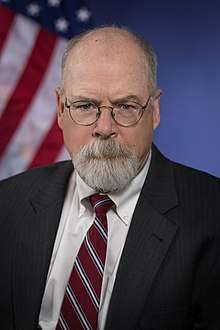John Durham (lawyer)
| John Durham | |
|---|---|
 | |
| United States Attorney for the District of Connecticut | |
|
Assumed office February 22, 2018 | |
| President | Donald Trump |
| Preceded by | Deirdre M. Daly |
| Personal details | |
| Born |
1950 (age 67–68) Boston, Massachusetts |
| Education |
Colgate University University of Connecticut School of Law, (JD) |
John Henry Durham (born 1950)[1][2] is the United States Attorney for the District of Connecticut. He is best known for leading an inquiry into allegations that FBI agents and Boston police had ties with the mob[3] and his appointment as special prosecutor regarding the 2005 CIA interrogation tapes destruction.[1] On November 1, 2017, he was nominated by President Donald Trump to be Connecticut's next U.S. Attorney.[4] On February 15, 2018, his nomination to be the United States Attorney was confirmed by voice vote. He was sworn in on February 22, 2018.
Education and early life
Durham graduated with honors from Colgate University in 1972.[5] Durham received a law degree in 1975 from the University of Connecticut School of Law.[1] After graduation, he was a VISTA volunteer for two years on an Indian reservation in Montana, after which he joined the U.S. Attorney's Office for the District of Connecticut.[5]
Career
Amid allegations that FBI informants James "Whitey" Bulger and Stephen "The Rifleman" Flemmi had corrupted their handlers, US Attorney General Janet Reno named Durham special prosecutor in 1999. He oversaw a task force of FBI agents brought in from other offices to investigate the Boston office's handling of informants.[6]
In December 2000, Durham revealed secret FBI documents that convinced a judge to vacate the 1968 murder convictions of Enrico Tameleo, Joseph Salvati, Peter J. Limone and Louis Greco because they had been framed by the agency. In 2007, the documents helped Salvati, Limone, and the families of the two other men who had died in prison win a US$101.7 million civil judgment against the government.[6]
In 2002, Durham helped secure the conviction of retired FBI agent John J. Connolly Jr., who was sentenced to 10 years in prison on federal racketeering charges for protecting Bulger and Flemmi from prosecution and warning Bulger to flee just before the gangster's 1995 indictment.[6]
Durham's task force also gathered evidence against retired FBI agent H. Paul Rico who was indicted in Oklahoma on state charges that he helped Bulger and Flemmi kill a Tulsa businessman in 1981. Rico died in 2004 before the case went to trial.[6]
Durham also led a series of high-profile prosecutions in Connecticut against the New England Mafia and corrupt politicians, including former governor John G. Rowland.[6]
In 2008, John Durham was appointed by then-Attorney General Michael Mukasey to investigate the destruction of CIA videotapes of detainee interrogations.[7][8][9] On November 8, 2010, Durham closed the investigation without recommending any criminal charges be filed.[10] Durham's final report remains secret but was the subject of an unsuccessful lawsuit under the Freedom of Information Act filed by The New York Times reporter Charlie Savage.[11]
In 2009, Attorney General Eric Holder appointed Durham to lead the Justice Department's investigation of the legality of CIA's use of so-called "enhanced interrogation techniques".[12]
In September 2009, University of Toledo law professor Benjamin G. Davis attended a conference where former officials of the Bush administration had told conferences participants shocking stories, and accounts of illegality on the part of more senior Bush officials.[13] Davis wrote an appeal to former Bush officials to take their accounts of illegality directly to Durham. In November 2011, Durham was included on The New Republic's list of Washington's most powerful, least famous people.[14]
References
- 1 2 3 Lewis, Neil A. (January 13, 2008). "Prosecutor Who Unraveled Corruption in Boston Turns to C.I.A. Tape Case". The New York Times. Retrieved July 10, 2017.
- ↑ Committee Questionnaire
- ↑ Politi, Daniel (January 3, 2008). "The Jump Off". Slate.
- ↑ Mahony, Edmund H. (November 1, 2017). "President Trump Nominates John Durham To Be U.S. Attorney". Hartford Courant. Retrieved November 1, 2017.
- 1 2 James, Randy (August 26, 2009). "CIA Abuse Investigator John Durham". Time. Retrieved July 10, 2017.
- 1 2 3 4 5 Murphy, Shelley (January 7, 2008). "US prosecutor's tenacity is rewarded". The Boston Globe.
- ↑ Shapiro, Lila (August 24, 2009). "'Inhumane' CIA Terror Tactics Spur Criminal Probe". Huffington Post.
- ↑ The Associated Press (January 2, 2008). "Criminal probe opened over CIA tapes". Seattle Post-Intelligencer.
- ↑ Apuzzo, Matt (January 3, 2008). "Veteran prosecutor takes over CIA probe". Seattle Post-Intelligencer.
- ↑ Mazzetti, Mark; Savage, Charlie (November 9, 2010). "No Criminal Charges Sought Over C.I.A. Tapes". New York Times. Retrieved October 14, 2011.
- ↑ Savage, Charlie (May 10, 2018). "Gina Haspel's Testimony About C.I.A. Torture Raises New Questions". The New York Times. Retrieved June 22, 2018.
Mr. Rodriguez and Ms. Haspel were later investigated by John Durham, an assistant United States attorney. Mr. Durham ultimately recommended filing no charges over the tape destruction, but his report laying out his findings and reasoning is secret. (The New York Times lost a Freedom of Information Act lawsuit to make it public.)
- ↑ Johnson, Carrie (August 25, 2009). "Holder Hires Prosecutor to Look Into Alleged CIA Interrogation Abuses". The Washington Post. Retrieved May 6, 2010.
- ↑ Benjamin G. Davis (September 25, 2009). "Torture Tales: Calling John Durham". The Jurist. Archived from the original on September 24, 2009. Retrieved September 27, 2009.
- ↑ The Editors (November 3, 2011). "Washington's Most Powerful, Least Famous People". The New Republic. Retrieved October 25, 2011.